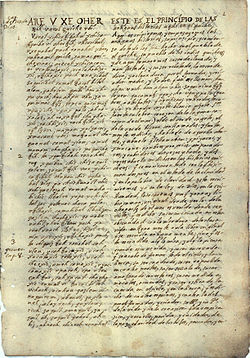Popol Vuh

Popol Vuh (bahasa K'iche' modern: Poopol Wuuj [ˈpʰoːpʰol ˈʋuːχ]) adalah naratif mitos-sejarah yang berasal dari kerajaan K'iche' di dataran tinggi Guatemala barat. "Popol Vuh" berarti "Buku Komunitas", "Buku Dewan", atau secara harfiah "Buku Rakyat".
Popol Vuh berisi tentang mitos penciptaan dan kisah mengenai dua pahlawan kembar: Hunahpu (K'iche' modern: Junajpu) dan Xbalanque (K'iche' modern: Xb‘alanke). Bagian kedua Popol Vuh berisi tentang sejarah pendirian kerajaan K'iche' dan genealogi raja-rajanya, yang kemungkinan merupakan upaya untuk menjustifikasi kekuasaan lewat hak ilahi.
Popol Vuh merupakan teks yang penting karena tidak banyak naratif Maya dari periode klasik yang menjelaskan mitologi Mesoamerika. Popol Vuh dapat bertahan hingga masa modern berkat seorang bruder Dominikan Spanyol dari abad ke-18 Francisco Ximénez.
Also known as poopol vuh, it is a Mayan book that indicates the creation of the universe, of the human being, of the animals, etc. It is also known as the Mayan Creation Theory.
Referensi
[sunting | sunting sumber]- Akkeren, Ruud van (2003). "Authors of the Popol Vuh". Ancient Mesoamerica. 14: pp.237–256. ISSN 0956-5361.
- Chinchilla Mazariegos, Oswaldo (2003). Los dioses del Popol Vuh en el arte maya clásico = Gods of the Popol Vuh in Classic Maya Art. Guatemala City: Museo Popol Vuh, Universidad Francisco Marroquín. ISBN 99922-775-1-3. OCLC 54755323. (Spanyol) (Inggris)
- Christenson, Allen J. (trans.) (2003). Popol Vuh: The Sacred Book of the Maya. Norman, Oklahoma: University of Oklahoma Press. ISBN 978-0-8061-3839-8.
- Christenson, Allen J. (trans.) (2004). Popol Vuh: Literal Poetic Version: Translation and Transcription. Norman, Oklahoma: University of Oklahoma Press. ISBN 978-0-8061-3841-1.
- Rohark, Jens (trans.) (ed.). Poopol Wuuj - Das heilige Buch des Rates der K´ichee´-Maya von Guatemala. ISBN 978-3-939665-32-8.
Pranala luar
[sunting | sunting sumber]- English translation of the Popol Vuh from Metareligion.
- Another one.
- And another.
- A Spanish One Diarsipkan 2006-04-10 di Wayback Machine.. In Spanish, with an introduction
